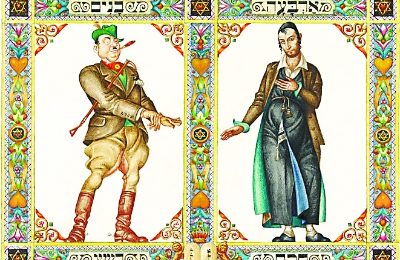The Passover seder is about many things: family, food, storytelling, ritual, camaraderie. One aspect that we particularly enjoy is the discussion around the Haggadah. The rabbis tell us that much of the seder’s rituals are there to provoke questions, and we’re reminded on Passover how essential questioning is to Judaism. So the irony is that sometimes we have more to say about the seder after it’s over.

We thought we’d share some of the insights we heard over the two seder nights – and we’d love to hear yours.
The power of imagination
One was inspired by David Hartman, founder of the Shalom Hartman Institute in Jerusalem who passed away only recently. Quoted in the Family Participation Haggadah, Hartman points to the miracles in the story of the Exodus seeming, on the surface, as mythological. The ten plagues (and splitting of the Red Sea) could be perceived as a “ancient superstition”. But it’s the element of the fantastical – belief in the miracle – that forms the core of hope for those seeking liberation. To hope means to engage the imagination, and fantasize. People don’t hope for what they already know, they hope for what seems unachievable, or even unimaginable.
It’s why the story of Exodus has for millenia inspired people who are suffering, and people in bondage. Exodus inspires people to hope regardless of the conditions surrounding them. And, in turn, it’s the ability to believe that the miraculous can happen, that inspires people to stand up for the change they want to see.
‘Do not rejoice in the downfall of your enemy’
Another insight we enjoyed spun off from the ritual of spilling wine when reciting the ten plagues (okay, there is some overlap here!), which, according to Don Isaac Abarbanel we do to recognize that others suffered in our redemption. Although these Egyptians, according to Scripture, deserved divine punishment, one should not “rejoice at the fall of your enemy,” as it says in Proverbs 24:17.
Rabbi Meir Simcha Cohen of Dvinsk, Latvia (1843-1926), says that Torah doesn’t mention joy in relation to Passover as it does to Shavuot and Sukkot. And aside from the first day, we do not recite the full Hallel service on Passover, again, as is done on the two other pilgrimage feasts. Why? Like Abarbanel, Rabbi Cohen points to the proverb, “In the downfall of your enemy, do not rejoice.” We celebrate the Exodus, our redemption and liberation, but not the downfall of the Egyptians.
It’s an incredibly important and transferable life lesson, and when boiled down, is really a message of focusing on the positive – and on progress – than on the negative.
Were you inspired by any stories or commentary you heard at the seder?













One thought on “Seder insights”